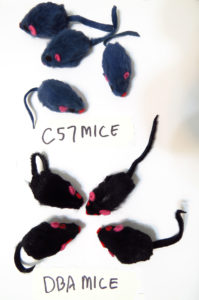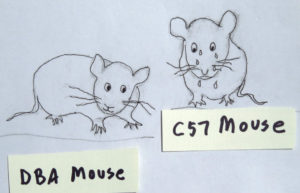For years I wondered why people, including myself, were unable to say “no” to certain foods. A book titled The Sugar Addict’s Total Recovery Program by Kathleen DesMaisons provides some answers to this question. DesMaisons has a degree in Addictive Nutrition, which uses nutrition to heal addiction.
DesMaisons writes that some people have “sugar sensitivity” which she attributes as having 3 main causes:
- blood sugar that over reacts to refined carbohydrates (sugar, bread, and other foods made from flour)
- low serotonin levels (brain chemical needed for good moods and ability to “say no”)
- low levels of beta-endorphins (brain chemicals that increase handling physical and emotional pain)
DesMaisons identifies reasons for compulsive overeating based on brain chemistry. She explains that people have different levels of beta-endorphins. People with high levels of beta-endorphins like themselves more, have more self-confidence, find it easy to make friends, and don’t let problems upset them much.
DesMaisons writes that people with low levels of beta-endorphins have brains that try to make up for these low levels by “upregulating” — which opens more beta-endorphin receptors. The brain opens these receptors to try to get more beta-endorphins, just like you would open your window more to get more cool air in your house. She believes this upregulating is one reason why a person with the low levels of beta-endorphins gets a bigger hit from foods with sugar or flour than the person’s friends. What tastes delicious to one person can make the sugar sensitive person feel she is in heaven and reduce any kind of pain she feels.
If the sugar-sensitive person decides to stop eating sugar and refined carbs, the receptors of the beta-endorphins go into withdrawal and make the person feel she must have some kind of sugar to ward off the resulting depression and cravings. It is then that she feels how low her beta-endorphins are. Many sugar-sensitive people never get past the withdrawal stage as they eat more sugar to avoid the withdrawal symptoms of irritability, anger, depression, and emptiness — quickly becoming addicted to sugar.
The most interesting part of the book is when DesMaisons describes research that has been done on beta-endorphins and alcoholism by Dr. Christine Gianoulakis at McGill University. Gianoulakis worked with two different strains of mice that were bred in laboratories to have different internal chemistry. One group of mice, called the C57GL mice, got drunk quicker than then the other group of mice, who were called the DBA mice. The C57 mice had low levels of beta-endorphins compared to the DBA mice. They also had “a very big interest in sugars.” The C57 mice preferred the taste of sweet things far more than their buddies, DBA mice, did. Sugar activates beta-endorphins.

I found it surprising that C57 mice had a reaction to morphine 35 times more powerful than the DBA mice. What a huge difference in response! DesMaison notes that “Sugar creates a response in the brain using the same biochemical pathways as morphine and both affect the beta-endorphin system.” This explains why the sugar-sensitive people find eating sugar so helpful in reducing the different kinds of emotional and physical pain they feel.
Another surprise was to learn that C57 mice babies responded differently than the DBA mice babies did. Both groups of baby mice were taken from their mothers and cried. When the scientists gave both groups of baby mice sugar water, the C57 baby mice stopped crying but the DBA mice continued to cry. No wonder foods with sugar are many people’s “drug of choice.”

The C57 mice also reacted differently than DBA mice when put in a no-win situation. They crouched, becoming immobile and defensive — while the DBA mice became active, trying to find solutions. This explains why people who stop eating sugar say they can think more clearly, feel more alert, and have more energy. It also explains why people who continue overeating sugar feel lack of motivation to change or do things.
The positive effects of sugar do not last in people who are sugar sensitive. It does not take long before the craving begins again. Research shows when people eat sugar frequently on a regular basis for years, it usually causes very serious health problems. I will cover this in a future blog post.
You can learn more how I help people recover from overeating and/or under eating Here

